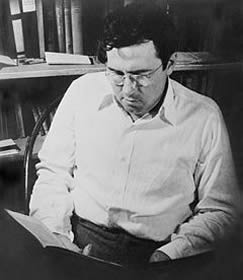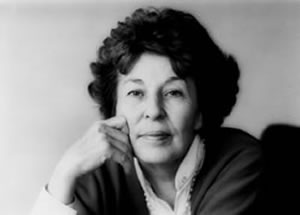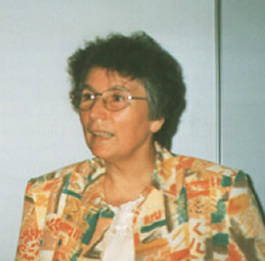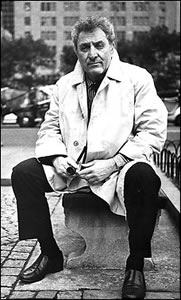De Amerikaanse schrijver James Thomas Farrell werd geboren op 27 februari 1904 in Chicago. Zie ook alle tags voor James T. Farrell op dit blog.
Uit: Young Lonigan
„Studs Lonigan, on the verge of fifteen, and wearing his first suit of long trousers, stood in the bathroom with a Sweet Caporal pasted in his mug. His hands were jammed in his trouser pockets, and he sneered. He puffed, drew the fag out of his mouth, inhaled and said to himself:
Well, I’m kissin’ the old dump goodbye tonight.
Studs was a small, broad-shouldered lad. His face was wide and planed; his hair was a light brown. His long nose was too large for his other features; almost a sheeny’s nose. His lips were thick and wide, and they did not seem at home on his otherwise frank and boyish face. He was always twisting them into his familiar tough-guy sneers. He had blue eyes; his mother rightly called them baby-blue eyes.
He took another drag and repeated to himself:
Well, I’m kissin’ the old dump goodbye.
The old dump was St. Patrick’s grammar school; and St. Patrick’s meant a number of things to Studs. It meant school, and school was a jailhouse that might just as well have had barred windows. It meant the long, wide, chalk-smelling room of the seventh- and eighth-grade boys, with its forty or fifty squirming kids. It meant the second floor of the tan brick, undistinguished parish building on Sixty-first Street that had swallowed so much of Studs’ life for the past eight years. It meant the black-garbed Sisters of Providence, with their rattling beads, their swishing strides, and the funny-looking wooden clappers they used, which made a dry snapping sound and which hurt like anything when a guy got hit over the head with one. It meant Sister Carmel, who used to teach fourth grade, but was dead now; and who used to hit everybody the edge of a ruler because she knew they all called her the bearded lady. It meant Studs, twisting in his seat, watching the sun come in the windows to show up the dust on the floor, twisting and squirming, and letting his mind fly to all kinds of places that were not like school. It meant Battleaxe Bertha talking and hearing lessons, her thin, sunken-jawed face white as a ghost, and sometimes looking like a corpse. It meant Bertha yelling in that creaky old woman’s voice of hers.“

James T. Farrell (27 februari 1904 – 22 augustus 1979)
De Duitse schrijfster en dichteres Elisabeth Borchers werd geboren in Homberg op 27 februari 1926. Zie ook alle tags voor Elisabeth Borchers op dit blog.
August
Es kommt eine Zeit,
da wachsen die Bäume
in den Himmel.
Die Blumen wollen so groß sein
wie Bäume.
Der Himmel hoch oben
hat Wolken.
Es kommt eine Zeit,
da gehen rote Pilze
durch den Wald
und schwarzgelackte Käfer.
Da ist die Sonne so heiß,
dass man sie nicht anfassen kann.
Da wächst es rot an den Sträuchern
und blau an den Gräsern.
Das sind die Tage der Beeren.
Eines Tages stand ich
Eines Tages stand ich am Ufer des Mississippi.
(Keine Erzählung.)
Das Hochwasser führte
(in dem ihm eigenen beschleunigten Fließen)
mit sich 1 gedunsene Kuh 1 gedunsenes Schwein
1 gedunsenen Baum 1 gedunsenen Strauch.
Nicht aber den Dampfer mit Rad.
Als ich mich unbeobachtet sah
tauchte ich eine Hand in das Kadaverwasser
meiner Kindheit.
Das ist keine Erzählung.
Das ist der Augenblick.

Elisabeth Borchers (Homberg, 27 februari 1926)
De Duitse schrijfster Vera Friedlander (eig. Veronika Schmidt) werd geboren op 27 februari 1928 in Woltersdorf. Zie ook alle tags voor Vera Friedländer op dit blog.
Uit: Ich bin Vergangenheit und Gegenwart
„Ich blicke auf ein bittersüßes Leben zurück. Beides habe ich geschmeckt, das Süße und das Bittere. Ich habe das in Honig getauchte Apfelstück am Abend von Rosch Haschana, dem jüdischen Neujahrstag, gegessen, auf dass das neue Jahr süß und angenehm sein möge, und ich nahm von dem Bitterkraut auf dem Sederteller, um nicht zu vergessen, wie hart das Leben war und noch immer sein kann. Ich meine mein eigenes, das bittere und doch so schöne Leben. Viele glückliche Honigtage habe ich erlebt und solche, in denen ich glaubte, der Kummer würde mich um den Verstand bringen. Ich sage nicht, solches sei mir beschieden gewesen. Welches unaussprechbare Wesen sollte mir etwas gegeben oder genommen haben? Das Glück, das mir begegnete, waren Menschen, die ich liebte, waren Freunde und günstige Umstände. Den Kummer musste ich ertragen, weil ich eben diese Menschen verlor. Eine Biografie folgt dem Ablauf der Zeit. Ich greife etwas wahllos in die Jahre. Einzelne Seiten aus dem Buch meines Lebens greife ich heraus. Mein Lebensweg ist daraus ablesbar, wenn auch nicht als chronologische Folge. Was fehlt, habe ich an anderer Stelle geschrieben, das Wichtigste in meinem autobiografischen Bericht über die Jahre bis 1945. Im Grunde enthält alles, was ich geschrieben habe, etwas von mir. Ich erfand Figuren und Geschichten und stattete sie mit dem aus, was ich gesehen, erlebt, gedacht und gefühlt habe. Und manche authentische Person habe ich abgebildet. Es gab zwei Zäsuren in meinem Leben, die erste 1945, die zweite 1986. So entstanden drei Lebensphasen. 1945 endeten meine Mädchenjahre, 1986 die beste Zeit meines Lebens, danach gab es noch einen neuen Anfang. Meine Kindheit und meine Mädchenjahre wurden geprägt durch die Shoa. Die große jüdische Familie, zu der ich gehörte, wurde deportiert, nur drei kamen aus Lagern zurück und Einzelne überlebten durch Emigration oder durch nichtjüdische Ehepartner.“

Vera Friedlander (Woltersdorf, 27 februari 1928)
In 1996
De Amerikaanse schrijver Irwin Shaw werd geboren op 27 februari 1913 als Irwin Gilbert Shamforoff in New York. Zie alle tags voor Irwin Shaw op dit blog.
Uit: The Eighty-Yard Run
“The center floated by, his hands desperately brushing Darling’s knee as Darling picked his feet up high and delicately ran over a blocker and an opposing linesman in a jumble on the ground near the scrimmage line. He had ten yards in the clear and picked up speed, breathing easily, feeling his thigh pads rising and falling against his legs, listening to the sound of cleats behind him, pulling away from them, watching the other backs heading him off toward the sideline, the whole picture, the men closing in on him, the blockers fighting for position, the ground he had to cross, all suddenly clear in his head, for the first time in his life not a meaningless confusion of men, sounds, speed. He smiled a little to himself as he ran, holding the ball lightly in front of him with his two hands, his knees pumping high, his hips twisting in the almost girlish run of a back in a broken field. The first halfback came at him and he fed him his leg, then swung at the last moment, took the shock of the man’s shoulders without breaking stride, ran right through him, his cleats biting securely into the turf. There was only the safety man now, coming warily at him, his arms crooked, hands spread. Darling tucked the ball in, spurted at him, driving hard, hurling himself along, all two hundred pounds bunched into controlled attack.
He was sure he was going to get past the safety man. Without thought, his arms and legs working beautifully together, he headed right for the safety man, stiff-armed him, feeling blood spurt instantaneously from the man’s nose onto his hand, seeing his face go awry, head turned, mouth pulled to one side. He pivoted away, keeping the arm locked, dropping the safety man as he ran easily toward the goal line, with the drumming of cleats diminishing behind him.“

Irwin Shaw (27 februari 1913 – 16 mei 1984)
